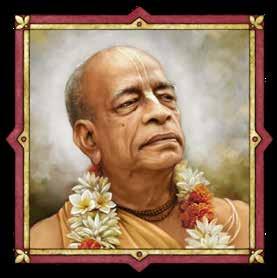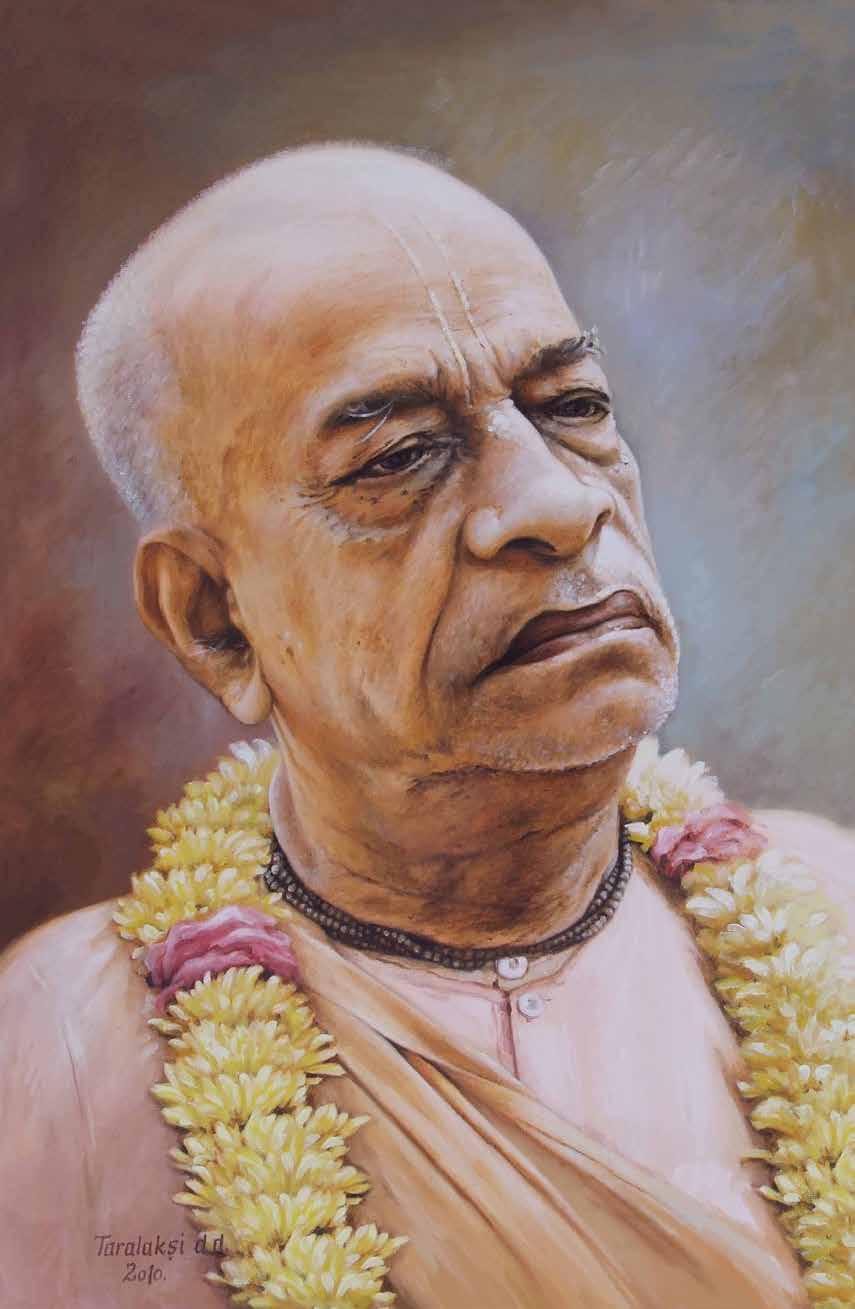Śrī Vilāpa-kusumāñjali
of Raghunātha Dāsa Gosvāmī

Volume Two
Commentary by Śivarāma Swami

of Raghunātha Dāsa Gosvāmī

Commentary by Śivarāma Swami
The “Kṛṣṇa in Vṛndāvana” series: Ś
uddha-bhakti-cintāmaṇi
Veṇu-gītā
Na Pāraye ’Ham
Kṛṣṇa-saṅgati
Śrī Dāmodara-jananī
Saṅkalpa-kaumudī – A Moonbeam on Determination
Śrī Vilāpa-kusumāñjali of Raghunātha Dāsa Gosvāmī – Vol. 1
Other Books by Śivarāma Swami:
The Bhaktivedanta Purports
The Śikṣā-guru – Implementing Tradition Within iskcon
Śikṣā Outside iskcon
Saṅkalpa-kaumudī
Nava-vraja-mahimā, Volumes 1-9
Sādhavo Hṛdayaṁ Mahyam – Saints Are My Heart
My Daily Prayers
The Awakening of Spontaneous Devotional Service
Varṇāśrama Compendium Volume 1
Gauḍīya-stotra-ratna – The Gemlike Prayers of Gauḍīya Vaiṣṇavas
Śrī Vilāpa-kusumāñjali – A Rendering Chant
Chant More
of Raghunātha Dāsa Gosvāmī
Based on the writings of A. C. Bhaktivedanta Swami Prabhupāda and the previous ācāryas

Commentary by Śivarāma Swami


Kṛṣṇa in Vṛndāvana
Volume Seven
Śrī Vilāpa-kusumāñjali of Raghunātha Dāsa Gosvāmī
Volume Two
© 2023 Śivarāma Swami
© 2023 Lāl Publishing, Hungary
Managing Director:
Manorāma Dāsa
Editrix: Braja Sevakī Devī Dāsī
Assistant Editor: Ānanda Caitanya Dāsa
Copy Editor: Mahābhāva Dāsa
Sanskrit Editors: Gabhīra Dāsa
Mañjarī Devī Dāsī
Art Director: Akṛṣṇa Dāsa
Artists: Gāndharvikā Devī Dāsī
Taralākṣī Devī Dāsī
Smṛti-pālikā Devī Dāsī
Layout & Design: Sundara-rūpa Dāsa

Indexing: Revatī Devī Dāsī
Respects and thanks to those who also contributed to this book: Kamalanātha, Śeṣa, Senāpati, Kṛṣṇa-Caitanya, and Śyāma Vṛkṣa.
Special thanks and much gratitude to Vidyāgati Devī Dāsī for making the printing of this book possible.
Quotes from the books, lectures, letters, and conversations by His Divine Grace A. C. Bhaktivedanta Swami Prabhupāda © The Bhaktivedanta Book Trust International 1966-1977. Used with permission.
ISBN 978-615-6379-24-5
Printed in Hungary
Readers interested in the subject matter of this book are invited to visit the following website:
www.sivaramaswami.media

This book is dedicated to Śrīla Prabhupāda, who taught that chanting Hare Kṛṣṇa means to request Śrīmatī Rādhārāṇī to accept us as her maidservants and thus engage us in her service.
In the beginning of the Hare K ṛṣṇ a mah ā -mantra we first address the internal energy of Kṛṣṇa, Hare. Thus we say, “O Rādhārāṇī!


Hare!

When we address someone in this way, they usually say, “Yes, what do you want?” The answer is, “Please engage me in your service.” This should be our prayer.
–– His Divine Grace A. C. Bhaktivedanta Swami Prabhupāda, Teachings of Lord Kapila 32, Purport.
To my dear friend and guide His Holiness Devāmṛta Swami I ofer special thanks for volunteering to fine polish this and future volumes of commentaries to Vilāpa-kusumāñjali.
He has given so much of his time and expertise in refining the manuscript and guiding our editors towards the level of his own first-class standards. Additionally, he has pointed out areas where my writing lacks clarity and has advised me in “advance defence planning” with topics that may be controversial in iskcon.

I remain in his debt for bringing his unique flair to this commentary on Raghun ā tha D ā sa Gosvāmī ’s masterpiece.

This volume is also dedicated to Her Grace G ā ndharvik ā Dev ī Das ī , who succumbed to illness before the book was completed. G ā ndharvik ā lived in the Vṛ nd ā vana that she painted, and was a truly devotional talent. Although our acquaintance was short, my heart aches in her absence. The future volumes of this book will not be the same without the touch of her magical brush, yet I take consolation in the belief that she has entered the pastimes that she loved so much and is learning how to serve the divine couple in the way of Rati-mañjarī. I shall always remain in her debt.
I pray that Raghun ā tha D ā sa Gosv ā m ī and the divine couple shower their blessings upon her, and that Rati-mañjarī takes her by the hand and, in some far-of planet in Kṛṣṇa’s creation, teaches her the devotional arts she dedicated her life to. All glories to her beautiful sevā.


I ofer my respectful obeisances to the lotus feet of my spiritual master, who has o f ered me safe passage along the path leading from the fiery maze of material enjoyment to the secure refuge of Vraja’s divine couple.
Through his books, spoken words, and inner guidance, Ś r ī la Prabhup ā da taught me the process of pure devotional service. As a result of his teachings, an aspiration has awakened in me to serve Kṛṣṇa in the way of the Vraja-vāsīs, specifically in the way that Rati-mañjarī serves Śrīmatī Rādhārāṇī.

May His Divine Grace continue to guide me along the journey of sādhana-bhakti enriched with spontaneous attachment, a journey that leads to the destination of ecstatic devotion and realisation of my spiritual form.
All glories to Śrī Rūpa Gosvāmī, who through his teachings has revealed Caitanya Mahāprabhu’s divine mission to the world, and who has inspired my gurudeva and his loyal followers to spread those teachings to every town and village.
May Śrī Caitanya Mahāprabhu confer his blessings upon all sincere devotees who dedicate themselves to knowing and serving his mission, devotees who show by example what it means to go back home, back to Godhead.
I bow before the lotus feet of my worshipable deities, R ā dh āŚyāmasundara. May they fulfil the humble entreaty of an old man
who has dedicated his life to their service and who harbours the long-standing hope of securing their mercy.
With a clump of straw between my teeth, I bow before Śrī Raghunātha Dāsa Gosvāmī, ever grateful that my guardians and well-wishers have shown me the path to his lotus feet. May he take the hand of this follower and introduce him to the service of Śrīmatī Rādhārāṇī.
śrī-rādhikā-prasādārthaṁ vilāpa-kusumāñjaliḥ nirmito yena tasmai śrīdāsa-gosvāmine namaḥ
I o fer my respectful obeisances unto the lotus feet of Ś r ī Raghun ā tha D ā sa Gosv ā m ī , who, in his unwavering desire to please Ś r ī mat ī R ā dh ā r āṇī , disclosed the contents of his heart by composing this plaintive flower-ofering of prayers, Śrī Vilāpa-kusumāñjali.
All glories to the glistening touchstone seated in the crown of the personified Vedas, Śrī Vilāpa-kusumāñjali, the devotional radiance of which pierces the heart’s deepest recesses and awakens a desire to become the object of a gopī ’s mercy.
I ofer my respectful obeisances to those Vaiṣṇavas in pursuit of pure devotion, and to the great sādhus who have been instrumental in guiding me to my current aspiration. By comparison to my predecessors I am insignificant, yet I dare to embark on this work of composing commentary on Vil ā pa-kusum ā ñjali . O merciful Vaiṣṇavas! I fall at your feet and pray,
“Bless me that I may do justice to this great work, its original author, and the confidential service of Śrī Rādhā.”
Śivarāma Swami
Nityānanda-trayodaśī
Śrī-dhāma Māyāpur, 2022
Volume One of Vil ā pa-kusum ā ñjali has an extensive introduction that covers a majority of the questions that readers may have about this publication. We suggest that devotees who have not read that introduction please do so. It is not included in this volume, nor will it be in future volumes. It is very long, and served more as an introduction to the entirety of the commentary rather than to just one volume.
Comparatively, this introduction to Volume Two is short. Generic to Volumes Two to Eight, it deals with only one topic: the eligibility of the readers. * * * *



e have been asked whether it is wise to make Vilāpakusumāñjali available to anyone and everyone without discrimination. After all, some concerned devotees say, this book is meant for advanced devotees, liberated devotees.

Our answer to this unease is covered in this introduction.
We begin with the logic that it would be quite di f cult to sell these books selectively to devotees of a certain attainment or level of advancement.
Moreover, similar books and even more confidential ones, such as G ī ta-govinda, are easily available in the marketplace. If neophytes want to delve into topics on mādhurya-līlā, there are many books available, and no shortage of devotees who speak on those books.
Finally, sincere devotees who follow the principle of hearing according to qualification often purchase a book, despite being unqualified, so that it is available to them when they advance more.
But what exactly is the scriptural standard for practising sādhana according to qualification? The Lord personally answers that question to Uddhava in this way:
sve sve ’dhikāre yā niṣṭhā sa guṇaḥ parikīrtitaḥ viparyayas tu doṣaḥ syād ubhayor eṣa niścayaḥ
Steadiness in one’s own position is declared to be actual piety, whereas deviation from one’s position is considered impiety. In this way the two are definitely ascertained.1
Applying the above blueprint to hearing kṛṣṇa-līlā, the Lord says that devotees can hear increasingly confidential literature in proportion to the increased purity of their hearts and the increased wealth of their knowledge.
In light of this directive, it appears that there is one spiritual qualification for hearing Kṛṣṇa’s pastimes. Yet if we look at the writings of our predecessors, we see that their standard for reading books like Vilāpa-kusumāñjali covers a spectrum of qualification: on one end, faithful liberated devotees, and on the other, curious non-devotees.
The variance between one qualification and a range of qualifications is resolved in the following verse, which shows how one
eligibility accesses a key that in turn authorises a wide range of readers:
vikrīḍitaṁ vraja-vadhūbhir idaṁ ca viṣṇoḥ
śraddhānvito ’nuśṛṇuyād atha varṇayed yaḥ
bhaktiṁ parāṁ bhagavati pratilabhya kāmaṁ
hṛd-rogam āśv apahinoty acireṇa dhīraḥ
Anyone who faithfully hears or describes the Lord’s playful afairs with the young gopīs of Vṛndāvana will attain the Lord’s pure devotional service. Thus he will quickly become sober and conquer lust, the disease of the heart.2
This verse establishes the qualification to hear Kṛṣṇa’s pastimes with the gopīs to be faith in the transcendental nature of Kṛṣṇa’s conjugal sports.
Viśvanātha Cakravartī Ṭhākura elaborates on the nature of the faith that the Bhāgavatam mandates. He asserts,
Devotees must have confidence in the very special empowerment invested in hearing Kṛṣṇa’s gopī-pastimes.3
Even in the presence of material lust, hearing Kṛṣṇa’s mādhurya pastimes awakens kṛṣṇa-prema within the heart!
The ācārya is emphatic that if one does not have that faith, then the efect of such hearing, prema, will not manifest.
The significance of the vikrīḍitam verse reveals how the one factor of faith in the special empowerment of Kṛṣṇa’s gopī-līlā enables a spectrum of devotees to hear the r ā sa -pastime. How does the verse enable that? The one eligibility of faith empowers devotees at any stage of advancement with prema, and prema then qualifies that range of devotees to read mādhurya-līlā.
On one hand, this key of faith appears to be an undemanding criterion; on the other hand, the conviction that, by hearing, prema appears in even the lusty reader and purifies them is often a hard pill for devotees to swallow.

here are reasons why even devotees of learning will doubt that prema can appear within a sādhaka with anarthas. One reason is the misgiving that prema only appears in one quantitative measure, such as the love manifest in a siddha. However, as we shall show later, prema manifests in varying quantities, from the most diminutive in practitioners, to the greatest in Caitanya Mahāprabhu and Śrī Rādhā.
The other reason is pointed out by Jīva Gosvāmī in his Vaiṣṇavatoṣaṇī commentary to the vikrīḍitam śloka. The ācārya explains that the general rule of devotion is that prema only arises when the heart is free of all desire, not before, and certainly not in a practitioner. Scripture and Gauḍīya ācāryas share the same view; Caitanya Mahāprabhu describes the efect of nāma-saṅkīrtana in the same way; and Kṛṣṇa teaches the same principle in the Gītā— that prema-bhakti makes its appearance after liberation, not before:
brahma-bhūtaḥ prasannātmā
na śocati na kāṅkṣati samaḥ sarveṣu bhūteṣu mad-bhaktiṁ labhate parām
One who is thus transcendentally situated at once realises the Supreme Brahman and becomes fully joyful, he never laments or desires to have anything, and he is equally disposed toward every living entity. In that state he attains pure devotional service unto me.4
Based on these teachings, most devotees cannot accept how it is possible that prema can appear, for example, at the stage of anartha-nivṛtti and then gradually eradicate all dirty things in the heart, including lust. In other words, devotees generally do not have the faith mandated by the vikrīḍitam verse. However, there are similar examples of empowerment implemented by the Lord or by his devotees that result in miraculous
attainments superseding standard principles of sādhana. The following are two such examples.
Śrīmad-Bhāgavatam reveals a devotional activity that is empowered by Lord Brahmā.
When Droṇa and Dharā completed their devotional austerities, they requested the special benediction that whoever heard their son Kṛṣṇa’s childhood pastimes could “very easily accomplish that most difficult-to-obtain liberation.”5 Whether the liberation spoken about is brahma-bhūta or prema-bhakti, the benediction received by Droṇa and Dharā was that either difficult-to-attain perfection could be easily attained by hearing Kṛṣṇa’s childhood pastimes.
Similarly, by the simple sādhana of nāma-saṅkīrtana, Caitanya Mah ā prabhu made freely available the very exalted s ā dhya of vraja-prema, which up until his time was attained with great difculty, if at all. That is the purport of this well-known verse:
namo mahā-vadānyāya kṛṣṇa-prema-pradāya te kṛṣṇāya kṛṣṇa-caitanyanāmne gaura-tviṣe namaḥ
I ofer my respectful obeisances unto the Supreme Lord Śrī Kṛṣṇa Caitanya, who is more magnanimous than any other avatāra, even Kṛṣṇa himself, because he is bestowing freely what no one else has ever given—pure love of Kṛṣṇa.6
These examples confirm that by the blessings of the Lord or great devotees, an unexacting sādhana may easily bestow an otherwise difcult perfection. Lord Nārāyaṇa once revealed this confidential principle to Gopa-kumāra.
The Lord described how as he waited for the boy in Vaikuṇṭha, he hoped that in the material world Gopa-kumāra would abandon his wanton ways and, in some life, turn towards him and return home. But since Gopa-kumāra continued to bask in the temporary enjoyments of material life, that did not happen. And although Lord Nārāyaṇa tried to find a pretext on which to bring the boy back to Godhead, he could not, for that would have transgressed the timeless laws of spiritual life that he had created.
Still, the Lord finally grew so impatient that he breached his code of conduct and arranged for Gopa-kumāra’s birth in Govardhana, which otherwise would take many lifetimes of devotion. Moreover, the Lord personally became the boy’s guru, although Gopa-kumāra was unworthy of such august guidance. In the following words Lord Nārāyaṇa admits how he violated the regulations of which he was the founder:
anādiṁ setum ullaṅghya tvaj-janmedam akārayam
So I transgressed my eternal code of conduct and arranged for you to take your current birth.7

In conclusion, either by Ś ukadeva Gosv ā m ī ’s blessings or by the pastime’s own empowerment, when Kṛṣṇa’s rāsa-līlā is heard with faith, love of God enters the heart of the hearer and destroys unwanted habits—thereby superseding the devotional principle that prema manifests in only a clean heart. * * * *
he question arises of how the process of hearing mentioned in the vikr īḍ itam ś loka takes place and from whom. Although chanting and remembering the topic of gopī-līlā are also mentioned, both these processes are dependent on hearing. So from whom does one hear the actual texts, and more importantly, from whom does one hear the explanations to the texts of Śrīmad-Bhāgavatam?
Raghunātha Dāsa Gosvāmī says that devotees can acquire faith, taste, and love only through association with and service to a great devotee who is situated in rasa . 8 But even if one is blessed with such august company, then faith and love are only attained with the proviso that one is submissive to the blessing of advanced association. When a disciple is qualified by service and surrender, then
and only then will the spiritual mood of the guru be transmitted to his heart. Narottama Dāsa Ṭhākura sings,
cakhu-dāna dilā jei, janme janme prabhu sei divya-jñāna hṛde prakāśita prema-bhakti jāhā haite, abidyā bināśa jāte bede gāya jāhāra carita
He who has bestowed upon me the gift of transcendental vision is my lord, birth after birth. By his mercy, divine knowledge is revealed within the heart, invoking prema-bhakti and destroying ignorance. The Vedic scriptures sing of his character.9
One example of hearing from a realised authority is the wives of the br ā hma ṇ as, who by repeatedly hearing of K ṛṣṇ a, tat-kath ā , from the garland maker’s daughters of Vṛ nd ā vana, became enchanted, ākṣipta, by thoughts of him.10
Similarly, Śrīmad-Bhāgavatam states that by the association of Nanda and Yaśodā, the elder residents of Vṛndāvana became lovers of Kṛṣṇa:
tato bhaktir bhagavati putrī-bhūte janārdane dampatyor nitarām āsīd gopa-gopīṣu bhārata
Thereafter, O Mahārāja Parīkṣit, best of the Bhāratas, when the Supreme Personality of Godhead became the son of Nanda Mahārāja and Yaśodā, they maintained continuous, unswerving devotional love in parental afection. And in their association, all the other inhabitants of Vṛndāvana, the gopas and gopīs, developed the culture of kṛṣṇa-bhakti. 11
Finally, it is well known that the association of eternally perfect gop ī s is the path of perfection for s ā dhakas who take birth on the planet in the material creation where K ṛṣṇ a appears. As

soon as those sādhaka-gopīs reach puberty, by hearing from the nitya-siddha-gopīs they fully manifest loving attraction for Kṛṣṇa, known as pūrva-rāga. 12
It should be noted, however, that the association of great devotees is very rare; therefore scripture praises these great souls and the good fortune of their followers:
akṣṇoḥ phalaṁ tvādṛśa-darśanaṁ hi tanoḥ phalaṁ tvādṛśa-gātra-saṅgaḥ jihvā-phalaṁ tvādṛśa-kīrtanaṁ hi sudurlabhā bhāgavatā hi loke
O devotee of the Lord! The purpose of the visual sense is fulfilled simply by seeing you; to touch your body is the fulfilment of bodily touch; and the tongue is meant for glorifying your qualities, because in this world a pure devotee of the Lord is very difcult to find.13
As previously mentioned, if by some chance one is fortunate enough to encounter an associate of the Lord, one must know how to enquire from him in a way that he will bless one with the truths of Kṛṣṇa’s pastimes. Unfortunately, not all devotees have the wisdom to place learned enquiries before their gurus.
In the earlier example of the sādhaka-gopīs, some of them did not associate or did not know how to associate with the nityasiddha-gopīs. As a result those girls did not acquire prema, and the impurities within them were not burned away until later when they sufered absence from the rāsa-līlā.
In summary, preceding pages have shown that devotees at all stages of Kṛṣṇa consciousness are qualified to hear about Kṛṣṇa’s pastimes with the gop ī s provided they have faith in the unique nature of those narrations. Faith makes devotees recipients of prema, and prema purifies their hearts of the poison of lust, kāma.
Śrīla Prabhupāda’s purports empower and inspire readers to familiarise themselves with the contents and teachings of Śrīmad-Bhāgavatam, as well as to systematically study it one canto at a time.
This faith is acquired by quality association with a realised soul. In Kṛṣṇa’s words,
The self-realised soul can impart knowledge unto you because he has seen the truth.14

Imbued with such faith, devotees become greedy for topics of conjugal love, and their regulated devotion transforms to its spontaneous counterpart. * * *
n the introduction to The Kṛṣṇa Book, Śrīla Prabhupāda writes of the s ā dhakas and siddhas who are eligible to hear gopī-līlā. However, in those same pages His Divine Grace adds someone else to the list of people who may read his summary study of Kṛṣṇa’s pastimes. That inclusion is the materialist—even the materialist who takes pleasure in reading sex literature. Śrīla Prabhupāda writes,
The pastimes of the Lord are generally heard and relished by liberated souls. And yet the descriptions of the pastimes of Lord Kṛṣṇa are so attractive that they are relishable for all classes of men. There are three classes of men in this world. One class consists of liberated souls, another consists of those who are trying to be liberated, and the third consists of materialistic men. Whether one is liberated or is trying to be liberated, or is even grossly materialistic, the pastimes of Lord Kṛṣṇa are worth studying. This kṛṣṇa-kathā will also be very much appealing to the most materialistic persons because Kṛṣṇa’s pastimes with the gopīs are exactly like the loving afairs between young girls and boys within this material world. Therefore, when those who are after sex life in this material world hear about Kṛṣṇa’s
pastimes with the gopīs, they will relish transcendental pleasure, although it appears to be materialistic. The advantage will be that they will gradually be elevated to the spiritual platform. 15
The obvious question from the above is “how do materialistic people acquire faith in Kṛṣṇa’s pastimes with the gopīs?”
The answer is that they do not!
Their motive for hearing is mundane curiosity, academic study, or bare sensuality. Therefore their progress in not like that of the aspiring devotee.
Śrīla Prabhupāda points out that materialists who hear gopī-līlā because they are after some sex pleasure will “gradually be elevated to the spiritual platform.” In other words, after some time these materialists become devotees, whereupon they develop the appropriate faith and knowledge to appreciate kṛṣṇa-līlā. Based on the vikrīḍitam śloka, Śrīla Prabhupāda clearly explains why sensualists will be attracted to Kṛṣṇa’s pastimes and why they too are eligible candidates:
This kṛṣṇa-kathā will also be very much appealing to the most materialistic persons because K ṛṣṇ a’s pastimes with the gopīs are exactly like the loving afairs between young girls and boys within this material world. Actually, the sex feeling found in human society is not unnatural, because this same sex feeling is there in the original Personality of Godhead. The pleasure potency is called Śrīmatī Rādhārāṇī. The attraction of loving afairs on the basis of sex feeling is the original feature of the Supreme Personality of Godhead, and we, the conditioned souls, being part and parcel of the Supreme, have such feelings also, but they are experienced within a perverted, minute condition. Therefore, when those who are after sex life in this material world hear about K ṛṣṇ a’s pastimes with the gopīs, they will relish transcendental pleasure, although it appears to be materialistic. The advantage will be that they will gradually be elevated to the spiritual platform. In the
Bhāgavatam it is stated that if one hears the pastimes of Lord Kṛṣṇa with the gopīs from authorities with submission, then he will be promoted to the platform of transcendental loving service to the Lord, and the material disease of lust within his heart will be completely vanquished. In other words, such hearing will counteract material sex life.
This book, Kṛṣṇa, which is filled with kṛṣṇa-kathā, will thus appeal equally to the liberated souls and to persons who are trying to be liberated, as well as to the gross, conditioned materialist.
In the two preceding paragraphs, by the addition of non-devotees, Śrīla Prabhupāda has significantly extended the scope of eligibility to practically everyone. And yet in a later paragraph, His Divine Grace points out that there will be materialists who do not have interest in these topics.
Who are those unfortunate souls?
According to another statement of Śrīmad-Bhāgavatam, these are people who live a destructive lifestyle, who kill animals for their food, and who kill themselves by consumption of alcohol, cigarettes, and drugs. They are known as paśu-ghna, animal killers or killers of their own souls:16
nivṛtta-tarṣair upagīyamānād bhavauṣadhāc chrotra-mano-’bhirāmāt ka uttamaśloka-guṇānuvādāt pumān virajyeta vinā paśughnāt
Glorification of the Supreme Personality of Godhead is performed in the parampar ā system; that is, it is conveyed from spiritual master to disciple. Such glorification is relished by those no longer interested in the false, temporary glorification of this cosmic manifestation. These descriptions of the Lord are the right medicine for the conditioned soul undergoing repeated birth and death. Therefore, who will cease hearing such
glorification of the Lord except a butcher or one who is killing his own self?
Although hearing Vilāpa-kusumāñjali is generally the prerogative of liberated souls, in the quotes above Śrīla Prabhupāda makes clear that due to Caitanya Mah āprabhu’s great desire to inundate the world with talks of Kṛṣṇa, it can be said that any interested person may become the beneficiary of such transcendental literature. This is certainly an extension of the eligibility set in earlier sections. * * * *
Modifying Eligibility
e shall now conclude this study of eligibility by summarising the diferent types of eligible people, and by integrating the restrictions on eligibility prescribed by our ā c ā ryas . The ultimate purpose of the following sections, as of the entire introduction, is to make clear who may read Vilāpa-kusumāñjali.

Śrīla Prabhupāda has written that the people who are eligible to hear books on Kṛṣṇa’s mādhurya-līlā are both non-devotees and devotees.
Since non-devotees do not read as an act of sādhana and do not have faith in K ṛṣṇ a’s divinity, hearing of his pastimes only sets them on the road towards pure devotion. However, this commentary is written so that in their current life devotees may awaken or nurture their desire to serve the divine couple as Rati-mañjarī does. Since it is hardly likely that such serendipity will befall non-devotees, this book is written for devotees.
Of devotees there are two kinds: those who do not believe that hearing gopī-līlā bestows prema upon conditioned souls, and those who do—those without faith and those of faith.
Practitioners who do not have faith are regulated devotees, for they are under the sway of the standard purificatory process of s ā dhana-bhakti . These devotees may be further subdivided into those who are immature and those who are mature. While both
types of devotees may read Vilāpa-kusumāñjali, they may do so under one condition: that they immediately stop reading if they feel the stirrings of mundane lust. In Śrīla Prabhupāda’s words,
So if you become more lusty by hearing the pastimes of Rādhā-Kṛṣṇa, that means you are not fit. Stop it. Stop it. Do not be foolish.17
This condition may be considered the standard, overriding rule of thumb that applies to all readers. In this regard Jīva Gosvāmī also writes,
atra sāmānyato ’pi paramatva-siddhes tatrāpi paramaś re ṣṭ ha- ś r ī -r ā dh ā -sa ṁ valita-l ī l ā -maya-tad-bhajana ṁ tu paramatamam eveti svataḥ sidhyati. kintu rahasyal ī l ā tu pauru ṣ a-vik ā ravad-indriyai ḥ pit ṛ-putra-d ā sabhāvaiś ca nopāsyā svīya-bhāva-virodhāt. rahasyatvaṁ ca tasyāḥ kvacid alpāṁśena, kvacit tu sarvāṁśeneti jñeyam.
Although devotion to Kṛṣṇa and his pastimes with the gopīs is considered to be supreme, higher still is devotion to K ṛṣṇ a’s pastimes with his most beloved, Ś r ī Rādhā. This the ultimate conclusion of bhakti.
But these confidential pastimes of K ṛṣṇ a with R ā dh ā and the gop ī s should not be contemplated by people whose senses are disturbed by male feelings. Similarly, devotees who relate to the Lord as a father, son, or servant should not hear these pastimes, because the underlying conjugal mood of K ṛṣṇ a’s gop ī -l ī l ā is not complementary to other mellows. Finally, Kṛṣṇa’s pastimes are usually in the category of confidential and sometimes even more confidential.18
Immature devotees often struggle with the results of past impurities, and so if their curiosity inspires them to read Vil ā pakusumāñjali, they should do so with the permission and guidance of their spiritual master.
Mature devotees are those who have been steadily chanting
Kṛṣṇa’s holy name without fail for fifteen or twenty years, and so are free, or almost free, of all bad habits. Bhaktisiddhānta Sarasvatī
Ṭhākura has advised that these devotees should be taught about the potency of Kṛṣṇa’s pastimes and that they should hear about them from an advanced Vaiṣṇava.
All these days we have not spoken about l ī l ā . But this is our most confidential asset. This is our only sādhya, perfection. One should not make the mistake of thinking that anartha-nivṛtti is the prayojana, goal of life. Someone who is thinking like this will never enter into artha-pravṛtti, attaining that which is one’s need. For this reason, I will now begin speaking about aṣṭakālīya-līlā.
I know that you are not ready to hear it, but we should know that such a transcendental ideal exists within the realm of devotion. Beyond the realm of anartha-nivṛtti is artha-pravṛtti, the real world of service to Rādhā and Kṛṣṇa. This is the transcendental reality. If we do not know of this transcendental realm then all our eforts may end in nirvi ś e ṣ a-v ā da, impersonalism. Do not let your days pass in trying only for anartha-niv ṛ tti, artha-pravṛtti is also necessary. Anartha-nivṛtti is necessary until artha-pravṛtti is started. When artha-pravṛtti is present, anartha-nivṛtti becomes unimportant, and artha-prav ṛ tti becomes prominent. Those who have chanted harin ā ma for fifteen or twenty years should know such things.19
What will be the outcome of these mature devotees’ introduction to Rādhā-Kṛṣṇa’s conjugal pastimes?
Since they are vaidhī-bhaktas, some, perhaps most, will approach Kṛṣṇa’s pastimes as an act of duty and with hesitancy.
That hesitancy often arises from a misunderstanding that for conditioned souls to hear topics of m ā dhurya-l ī l ā is sahajiy ā ism and only leads to falling away from the path. From this
introduction, and the introduction to Volume One, it is clear that nothing could be further from the truth. We will not elaborate further, other than to note that the result of this misconception is that even with advanced association devotees will not awaken deep faith in K ṛṣṇ a’s gop ī pastimes. Rather, by continued practice of vaidhī-bhakti they will gradually rise to ecstatic devotion, at which stage both their greed and their love will awaken and they shall gain entrance into the treasurehouse of kṛṣṇa-līlā.
Other mature devotees will make the most of their opportunity and association, and with a new-found faith they will begin to practise a mixture of spontaneous and regulated devotion. Advancing along the stages of niṣṭhā, ruci, and āsakti, these devotees will experience prema, and they too will rise to ecstatic devotion.
Ā c ā ryas like Bhaktivinoda Ṭ h ā kura confirm that the bh ā va resulting from spontaneous attachment is more quickly attained and stronger than that resulting from regulated devotion. However, once having attained rati, both vaidhī-bhaktas and rāga-bhaktas will enter into mature attraction to the divine couple, and into eternal service to them.
Up to now this section has dealt with those who do not have faith in the potency of mādhurya-kathā, although a few advanced devotees do eventually acquire faith and are blessed with prema while on their path to bhāva-bhakti.
Faithful devotes are of two types: those who are practitioners, and those who are liberated. Of the practitioners a few practise spontaneous devotion, and of those who do, for most their spontaneous devotion is mixed with regulated devotion.
The practitioners are those who relish reading and hearing about conjugal pastimes, and learning Rūpa Gosvāmī ’s principles of rasa as taught to them by their advanced gurus . As a consequence of their strong faith in Rādhā-Kṛṣṇa’s pastimes, prema increasingly manifests in their hearts, and as it does so it cleans away anarthas and that greatest enemy, lust.
The liberated devotees are spontaneously attracted to mādhuryalīlā; indeed it is their very life and identity. Having realised their svarūpa, their constitutional identity as a mañjarī, these devotees no longer just read Kṛṣṇa’s pastimes but they also perceive them. As bh ā va-bhaktas these s ā dhakas gradually realise the eleven
bhāvas that define their true identity, and as premi-bhaktas they are blessed to enter Kṛṣṇa’s līlā. Bhaktisiddhānta Sarasvatī says,
You will be able to read all these books and become qualified to enter into the madhura-rasa permeating them when you are completely free from the grasp of consciousness dominated by desires for enjoying the external world. Then the storehouse of good fortune will be opened to you, and you will be its befitting heirs.20
In summary, while this Vilāpa-kusumāñjali and its commentary may be read by everyone, devotees will appreciate it according to their level of advancement. The purificatory efect of reading this book will similarly vary. And while there is no obligation for anyone to read Vilāpa-kusumāñjali, devotees who have practised strict sādhana for twenty years are strongly recommended to do so. The last section of this introduction will elaborate on these topics.
Yet before moving on we should again flag Śrīla Prabhupāda’s warning to all devotees, especially to the immature practitioners.
Śrīla Prabhupāda says that if Kṛṣṇa’s romantic escapades with the gopīs sexually agitate the reader, he should know he is not ready for these topics. Earlier we have quoted His Divine Grace on this important caution, and here we quote him again:
If you are actually advancing in devotional service, then the symptom will be that you will have no more material hankerings. And then if you actually hear about
Kṛṣṇa’s pastimes with Rādhārāṇī, then hṛd-roga-kāmān apahinoti, the disease of the heart, lusty desires, will vanish. That will be the real result. I have repeatedly said this. But if you become more lusty by hearing
Rādhā-Kṛṣṇa’s pastimes, then that means that you are not fit. Stop it. Stop it. Do not be foolish.21 * * * *
e have written about those who are eligible to, or at least who may read Vil ā pa-kusum ā ñjali and similar mādhurya literature. This section will briefly list those people who should not read or even be shown books detailing K ṛṣṇ a’s intimate gop ī pastimes. Obviously, there is no way to prohibit anyone from voluntarily searching for and reading such literature. However, Vaiṣṇavas should not participate in introducing ineligible people to books like Vilāpa-kusumāñjali. Learned devotees know that such an introduction in the name of preaching simply ofends Kṛṣṇa.
Ś

rīla Prabhupāda has made it well-known, as has this introduction, that these pastimes of the Lord are not for people who become romantically or sexually agitated by reading them. Freedom from sexual excitement is a litmus test for the eligibility to read. If reading rāsa-līlā disturbs one’s mind, then one should stop and wait until meticulous sādhana sufciently purifies one.
The next category who may not read comprises those who do not care to do so, being distracted by sinful life. This attitude of indi f erence is characteristic of the world’s population and so is an indication of just how few faithful devotees there are, what to speak of liberated ones.
Caitanya Mahāprabhu told Rūpa Gosvāmī that among human beings, those who are followers of the Vedic principles are considered civilised and among these, almost half simply give lip service while committing sinful activities. Among the followers of Vedic knowledge, most are karmīs who spend their time distinguishing between good and bad work, and out of many such sincere fruitive actors, there may be one who is actually wise. Out of many millions of such wise men, one may actually become liberated, and out of many millions of such liberated persons, a pure devotee of Lord Kṛṣṇa is very difcult to find. 22 The faithless are many, the faithful few.
Yet the primary disqualification of the faithless is not their immoral conduct but their indiference to sādhus.
The next category of those who should not hear are the worst
of the lot! They are the Māyāvādīs: those who hear of Kṛṣṇa’s pastimes so that they can learn to be Kṛṣṇa, or those who think that kṛṣṇa-līlā is a manifestation of the external energy, mā yā , or an occurrence within the realm of māyā . Pure devotees do not find anyone more despicable than these rascals.
Finally, similar to Māyāvādīs but one notch less despicable are the prākṛta-sahajiyās. These are mundane devotees who think that by imitating the dress, conduct, and ecstasy of Kṛṣṇa’s gopīs they can become a gopī in a material body and attract K ṛṣṇ a to their flesh-and-bones attributes.
Śrīla Prabhupāda has written much about both prākṛta-sahajiyās and Māyāvādīs and their gross misunderstandings about their identity, bhakti-yoga, and Kṛṣṇa. His Divine Grace has made clear why both deviants are disqualified from understanding the basics of Kṛṣṇa’s identity and pastimes, what then to speak of his most intimate dealings with his eternal associates.
Therefore, four types of people should never be encouraged to hear Vilāpa-kusumāñjali: the sensually agitated, the disinterested sinners, the prākṛta-sahajiyās, and the Māyāvādīs. Should devotees introduce these ineligible souls to Kṛṣṇa’s intimate afairs, they commit ofence to Kṛṣṇa’s holy names and lose their own qualification for hearing or speaking about gopī-līlā, as Sanat-kumāra explains,
It is an ofence to reveal the glories of the holy name or to give initiation to the faithless.23

* * * *
In Tables o visualise and better comprehend who may and may not read Vilāpa-kusumāñjali, the following tables summarise the topics presented so far.
aśraddadhāne vimukhe ’py aśṛṇvati yas copadeṣaḥ śiva-nāmāparādhaḥ

Non-devotees Devotees
No faith in Kṛṣṇa’s divinity
Motive for reading:
1. mundane curiosity
2. academic study
3. sensuality reading is not sādhana reading sets them on the path to pure devotion
No faith in the power of mādhurya-līlā
vaidhī-sādhakas read with hesitancy
immature mature 15-20 years of chanting almost free of bad habits
they may read with permission and guidance of their guru
they read with hesitancy due to misunderstanding it as sahajiyāism by practice, at bhāva they gain faith in the power of mādhurya-līlā
association
new found faith
practice vaidhī mixed with rāga
Faith in the power of mādhurya-līlā
sādhakas relish reading liberated realised mañjarī-svarūpa
mature vaidhī mature vaidhī mixed with rāga rāga
relish mādhurya-līlā with strong faith in its power
prema increasingly manifests and cleanses away lust
they don’t just read but perceive mādhuryalīlā
should immediately stop reading upon feeling the stirrings of mundane lust
• Sādhakas sensually agitated when reading
• Disinterested sinners indifferent to sādhus
• Prākṛta-sahajīyās, the imitators
• Māyāvādīs who think that Kṛṣṇa’s līlā is material
* * * *
ntil now we have spoken of eligibility as the qualification to hear Vilāpa-kusumāñjali. However, there is more to the word “hear” than just the casual aural reception the word
may imply. In the introduction of The Kṛṣṇa Book, Śrīla Prabhupāda writes,
The pastimes of the Lord are generally heard and relished by liberated souls.
Hearing and relishing is the qualification of devotees at ecstatic devotion, a stage indicating that by aural reception they can actually begin to enter into the pastimes and mood of Vil ā pakusumāñjali. This is certainly a diferent kind of hearing than that of the anartha-nivṛtti devotees who still struggle to fix their mind on the topic, and who still struggle to restrain their minds from sensual thoughts.
The conclusion from the above is that while Lord Caitanya’s magnanimous distribution of kṛṣṇa-prema invites all qualified people to hear mādhurya-līlā, still it will be heard in di f erent ways according to the hearer’s level of qualification.
We have repeatedly written that hearers are of two kinds: those who do and those who do not have faith in the transcendental nature of mādhurya-līlā. And while both categories are spiritually benefitted, strictly speaking only people of faith will be able to enter into the real spirit of conjugal pastimes. Those who do not have faith will not be blessed with prema; however, they will be purified in proportion to their attentiveness and their proximity to transcendental sound. On the other hand, advanced devotees with faith are blessed with prema, and with the greater purification that prema afects. Therefore their hearing is superior to that of their faithless counterparts.
Among people of faith, those up to but not including the stage of niṣṭhā will literally “lend an ear” to books like Vilāpa-kusumāñjali. While their uncontrolled mind and senses obstruct their following the content of what they hear, their good quality of faith blesses them with prema, and their hearing quickly bears fruit. Ś r ī la Prabhupāda describes this qualitative development of hearing:
So the first stage in the development of a taste for hearing about Kṛṣṇa is some preliminary appreciation; the second stage is association with devotees [meaning
hearing from them]; the third is engagement in devotional service, [which means speaking about K ṛṣṇ a]; and the fourth stage—achieved if one is actually executing the rules and regulations of devotional service under the guidance of a bona fide spiritual master—is freedom from unwanted desires and habits [which facilitates unobstructed hearing].24
In this quote Śrīla Prabhupāda measures the quality of hearing by the spiritual development it afects in a faithful hearer. And while it may appear that the e f ect of such hearing is insignificant and therefore unnecessary, it is essential for rising to a more mature stage. Even this inattentive hearing prior to the stage of steadiness is highly praised both by scriptures and by learned persons such as Mahārāja Pṛthu:
sa uttamaśloka mahan-mukha-cyuto bhavat-padāmbhoja-sudhā kaṇānilaḥ smṛtiṁ punar vismṛta-tattva-vartmanāṁ kuyogināṁ no vitaraty alaṁ varaiḥ
My dear Lord! You are glorified by the selected verses uttered by great personalities. Such glorification of your lotus feet is just like safron particles. When the transcendental vibration from the mouths of great devotees carries the aroma of the safron dust of your lotus feet, the forgetful living entity gradually remembers his eternal relationship with you. Devotees thus gradually come to the right conclusion about the value of life. My dear Lord! I therefore do not need any other benediction but the opportunity to hear from the mouth of your pure devotee.25
The hearers in this verse include the faithful and the faithless. The latter are categorised as being forgetful, vismṛta, which also establishes them as being below the stage of niṣṭhā.
Succeeding the devotees struggling with past bad habits are learned practitioners ranging from the stages of niṣṭhā to āsakti,
whose already growing taste for mañjarī-bhāva is nurtured in proportion to their eagerness to hear. However, the advanced devotees in āsakti as well as the realised devotees in bhāva and prema are those who successively enter ever deeper stages of conjugal rasa and draw ever nearer to Raghunātha Dāsa Gosvāmī ’s devotional ecstasy.
s previously mentioned, any devotee may read Vilāpakusum ā ñjali, and yet if the gop ī s’ romantic service to ṛṣṇ a causes readers to be mentally or physically agitated by sex desire, then they should put aside the book until a later date.

Although Śrīla Prabhupāda wanted Kṛṣṇa’s pastimes to be easily available to anyone willing to hear them, he was especially cautious about the Lord’s conjugal pastimes. Since most people in today’s sexually permissive society are deeply contaminated by lust, including some devotees, His Divine Grace wanted these readers to first be purified by Kṛṣṇa’s instructions and other pastimes. He therefore took a cautious approach to the application of the vikrīḍitam verse and followed Ṭhākura Bhaktivinoda’s advice to Bhaktisiddhānta Sarasvatī Ṭhākura:
Keep the songs of Caṇḍīdāsa and Vidyāpati with you for your personal bhajana, there is no objection to this. But do not reveal them to others, and if you do share them with others, then write at the top of the documents, “Confidential” and double-underline the word.26
On the other hand, devotees whose minds and senses remain undisturbed by hearing R ā dh ā -K ṛṣṇ a’s pastimes may read Vilāpa-kusumāñjali and be assured of being blessed with prema according to the strength of their faith. The concluding pages of this introduction describe the readers of Vilāpa-kusumāñjali and the resulting love and purification that they experience.
ince the word prema is used to designate many stages of attachment, we begin by clarifying the intensity of the attachment of which the vikrīḍitam verse speaks.

It is obvious that devotees from the stage of anarthanivṛtti to āsakti experience increasing degrees of love. However, the sādhakas at bhāva are the ones for whom one ray of the sun of prema—whose essence is the mixture of the saṁvit and hlādinī potencies—rises in the heart and softens it with desires to meet, serve, and exchange love with Kṛṣṇa. That one ray of prema indicates that the intensity of bhāva is miniscule, and since love is the only thing that controls Kṛṣṇa, this minute love has minute dominion over him.
If the love at bhāva-bhakti—which causes diferent symptoms of ecstasy, such as crying—is but one ray of prema, then how minute could the prema be that manifests during stages of practice up to attachment?
Diminutive!
Yet although prema in sādhana is modest to the extreme, nevertheless, because of the great power of love, even an atomic fraction of it has great potency for clearing away lust. Moreover, these stages of sādhana also control Kṛṣṇa in their own way, as the Lord himself declares to Uddhava:
na sādhayati māṁ yogo
na sāṅkhyaṁ dharma uddhava
na svādhyāyas tapas tyāgo yathā bhaktir mamorjitā
My dear Uddhava! The unalloyed devotional service rendered to me by my devotees brings me under their control. I cannot be thus controlled by those engaged in mystic yoga, Sāṅkhya philosophy, pious work, Vedic study, austerity, or renunciation.27
At the stage of prema, love manifests as the extremely condensed form of bhāva, completely softening the heart and manifesting in a devotee an extreme possessiveness of Kṛṣṇa. Nārada Muni and Veda-vy ā sa are two examples of bhaktas at the level of prema .
While the intensity of love at the stage of prema is more than of bh ā va, it is far less in strength when compared to the next level of love, vraja-prema. Therefore it can be said that the first level, prema, only partially controls Kṛṣṇa.
The next form in the progression of love is that to which s ā dhakas of Caitanya Mah ā prabhu aspire: the supreme love of the Vraja-vāsīs, known as vraja-prema or rāgātmika-bhakti. This form of love is spontaneous and is impelled exclusively by a deep thirst for Hari. It is infinitely greater than the reverential love that the residents of Vaikuṇṭha show for their Lord, and greater than even the love of the residents of Dvārakā, such as Arjuna. The love the cowherd boys possess for Kṛṣṇa, or the love of Mother Yaśodā gives him are both extraordinary in their ability to control Kṛṣṇa. This wonderful feature of love is what s ā dhana-siddhas attain, although their afection will always be somewhat weaker than the love their role models manifest.
Yet the greatest love of all, one that is unique and without equal or rival, is that of Ś r ī mat ī R ā dh ā r āṇī . As divine love personified and the source of the love by which every devotee binds K ṛṣṇ a, her love is greater than that of any gopa or gopī. And because Śrī
Rādhā’s love for him is immeasurably complete in every way, she always has Kṛṣṇa fully under her control.
We now continue describing the prospective readers of this book based on their faith, love, and purification.
We first consider the immature and mature vaidhī devotees who do not have faith that hearing this book can impart prema and thus quickly free them of lust. But these devotees, especially the mature ones, know that after long sādhana they should at least read books like Vilāpa-kusumāñjali. If they do read, then these regulated devotees will do so from a sense of obligation, which in itself dampens the mood Raghunātha Dāsa Gosvāmī experiences in both his sādhaka and siddha identities. Yet as these devotees continue reading, they acquire an increased taste that disperses the dampening factor of obligatory hearing.
The faithless devotees do not experience prema, yet they do experience the purification that comes from hearing Ś r ī madBhāgavatam “attentively and submissively.”28 Since we are assessing the prema that devotees acquire, such faithless devotees are
not part of this introduction’s evaluation. No doubt in time and by good association, they too will develop faith.
On the next level are the readers who have faith and are either mature vaidhī-bhaktas or mature vaidhī-bhaktas with a measure of rāga. These devotees may be situated at any of the stages of steadiness, taste, or attachment.
Through reading, love greatly enhances all the senses of steady devotees. Although material desires are still pervasive, lust appears only occasionally in their hearts.
The reading of devotees who have taste invokes a love that further empowers their gross and subtle senses. These devotees’ material habits are minimal, and lust makes rare appearances that are barely discernible.
When Vil ā pa-kusum ā ñjali is read by advanced devotees who have attachment for Kṛṣṇa and even more for Rādhā, prema manifests in a distinct shadow of itself, purifying their minds and their senses.
The conditioned souls whose hearing is most e f ective are the devotees who have both faith in K ṛṣṇ a’s conjugal pastimes and spontaneous attachment to them.
These devotees are situated in taste and attachment, and love enables them to almost perceive the pastimes of Vilāpa-kusumāñjali similar to how the shadow of an object appears on a white sheet. As with the faithful, mature devotees described earlier, advanced rāgānugā devotees purify their minds and senses, leaving only a trace of lust and its corollaries.
The final level of readers we shall study comprises the faithful, liberated devotees. Śrīla Prabhupāda writes of them,
The pastimes of the Lord are generally heard and relished by liberated souls. It is essential for persons who are actually liberated to hear about the pastimes of Kṛṣṇa. That is the supreme relishable subject matter for one in the liberated state.29
Spontaneous devotion quickly sprouts in devotees who have attained bh ā va through devotion that was regulated, spontaneous, or a mixture of the two. This is the nature of Caitanya
Mah ā prabhu’s line. Since liberated devotees are situated in the sprout of prema, their experience of love’s unfolding is direct, and consequently their faith is mature. Hearing Vilāpa-kusumāñjali, they enter into the preliminary stages of rasa, and so for them the verses of Dāsa Gosvāmī become a direct, heartfelt experience. These devotees have a natural thirst for the subject matter in this book. Topics of m ā dhurya-l ī l ā will nourish their bh ā va to prema, and then their prema to full rasa . In this way the result of bh ā va-bhaktas’ hearing is that they gain an absolute connection with the divine couple. This attainment brings three kinds of ecstasy: tears in the eyes, hairs standing on end, and faltering of the voice. Caitanya Mahāprabhu describes how a devotee doing nāma-saṅkīrtana will hanker for these ecstasies of bhāva:
nayanaṁ galad-aśru-dhārayā
vadanaṁ gadgada-ruddhayā girā pulakair nicitaṁ vapuḥ kadā tava nāma-grahaṇe bhaviṣyati
My dear Lord! As I chant your holy name, when will my eyes be beautified by their filling with tears that constantly glide down my cheeks, when will my voice constantly falter, and when will all the hairs on my body stand erect in transcendental happiness?30
Although it is said that the heart of liberated devotees is untainted, the fact is that the scent of impurities from past o f ences to the holy names still linger therein. By further hearing and chanting, however, every trace of impurity is washed away, and upon the complete blossoming of pure love, the wonderful realm of rasa is attained.
I have already expressed impudence by declaring that this commentary to Raghun ā tha D ā sa Gosv ā m ī ’s great work will be of spiritual benefit to faithful sādhakas. Therefore I dare not reflect upon the prema-bhaktas who bask in the bh ā vas of perfection. Even commenting on the great ā c ā rya’s masterpiece is evidence of this author’s shamelessness, what to speak of the mistakes in my composition that are evidence of my conditioned nature. Still
I have faith that my Vai ṣṇ ava readers will overlook my faults, since they too share my conviction in the infallible words of Śrīmad-Bhāgavatam:
tad-vāg-visargo janatāgha-viplavo yasmin prati-ślokam abaddhavaty api nāmāny anantasya yaśo ’ṅkitāni yat śṛṇvanti gāyanti gṛṇanti sādhavaḥ
On the other hand, that literature which is full of descriptions of the transcendental glories of the name, fame, forms, pastimes, etc., of the unlimited Supreme Lord is a diferent creation, full of transcendental words directed toward bringing about a revolution in the impious lives of this world’s misdirected civilisation. Such transcendental literatures, even though imperfectly composed, are heard, sung, and accepted by purified men who are thoroughly honest.31
I conclude this introduction by falling at the feet of the Vaiṣṇavas and begging them to forgive my shamelessness in composing this work.
Rukmiṇī Dvādaśī Budapest, 2023
1. Śrīmad-Bhāgavatam 11.21.2.
2. SB. 10.33.39.
3. Vi ś van ā tha Cakravart ī Ṭ h ā kura's commentary to Ś r ī madBhāgavatam 10.33.39.
4. Bhagavad-gītā 18.54.
5. Vi ś van ā tha Cakravart ī Ṭ h ā kura's commentary to Ś r ī madBhāgavatam 10.8.49.
6. Caitanya-caritāmṛta, Madhya-līlā 19.53.
7. Bṛhad-bhāgavatāmṛta 2.4.85.
8. Sva-saṅkalpa-prakāśa-stotra 1.
9. Prema-bhakti-candrikā 1.3.
10. SB. 10.23.18.
11. SB. 10.8.51.
12. SB. 10.29.9., Purport.
13. Hari-bhakti-sudhodaya 13.2, cited in Śrīmad-Bhāgavatam 2.9.39, Purport.
14. Bhagavad-gītā 4.34.
15. This and the following two quotes are from The Kṛṣṇa Book, Introduction.
16. SB. 10.1.4.
17. Ś r ī la Prabhup ā da lecture, Cc. Ā di-l ī l ā 1.6, M ā y ā pur, 30 March 1975.
18. Bhakti-sandarbha 338.
19. This quote is from a 1932 lecture by Bhaktisiddhānta Sarasvatī
Ṭhākura at Rādhā-kuṇḍa, printed in The Gauḍīya in 1934.
20. Śrī Bhaktisiddhānta Vaibhava, Volume 2, page 175.
21. Śrīla Prabhupāda lecture, Cc. Ādi-līlā 1.6, Māyāpur, 30 March 1975.
22. Cc. Madhya-līlā 19.146-148.
23. Padma Purāṇa, cited in Cc. Ādi-līlā 8.24, Purport.
24. Dharma: The Way of Transcendence 11, “Hearing of Kṛṣṇa with Faith.”
25. SB. 4.20.25.
26. Śrī Bhaktisiddhānta Vaibhava, Volume 2, page 176.
27. SB. 11.14.20.
28. SB. 1.1.2.
29. The Kṛṣṇa Book, Introduction.
30. Śikṣāṣṭaka 6.
31. SB. 1.5.11.
Caitanya Mahāprabhu came to relish Rādhā’s moods of separation and to introduce a similar mood of devotion to his followers. Vilāpa-kusumāñjali makes explicit reference to separation with the word vilāpa, while veiling the book’s pastime sequence with imagery in kusumāñjali.
(Vilāpa-kusumāñjali, Volume 1.)
ay Śrīla Raghunātha Dāsa Gosvāmī consider me his dependent. He is the principal r ū p ā nuga - vai ṣṇ ava, the eternal friend and follower of Ś r ī la R ū pa Gosvāmī. He personally witnessed the most intimate pastimes of Lord Caitanya under the care and guidance of Ś r ī la Svar ū pa D ā modara Gosv ā m ī . Lord Caitanya gave him Govardhana as his residence and the service of Śrīmatī Rādhikā as his only engagement. His sādhana is the standard for all Gauḍīya Vaiṣṇavas. As he lay weeping on the banks of Rādhā-kuṇḍa, his heart breaking in separation from Śrī Rādhikā, his lamentations ( vil ā pa ) poured forth in the form of a handful of flowers (kusumāñjali). This Śrī Vilāpa-kusumāñjali is the central jewel on the necklace of prayers (stavāvalī), which always adorn him. I shall keep this jewel as my most valuable treasure and await the time when I may reap its riches.

Vyāsa-pūjā homage, 1992
 Śrīla Tamal Krishna Goswami
Śrīla Tamal Krishna Goswami